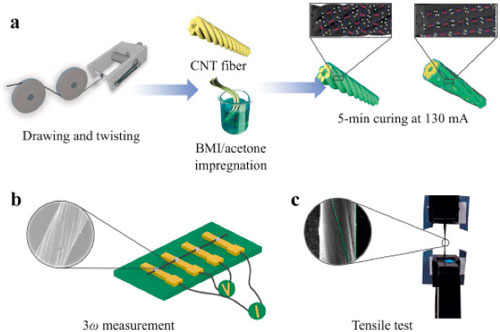Improve the performance of carbon nanotube fibers
QQ Academic Group: 1092348845
Detailed
| Carbon nanotube (CNT) fiber is an important one-dimensional macro material. The directional assembly of carbon nanotubes can help the fibers achieve high mechanical, high electrical and thermal properties. | |
| Unlike the structure with dispersed carbon nanotubes, the CNTs in the fiber are ordered and dense. This is conducive to heat conduction in the direction of fiber arrangement, thereby achieving effective heat conduction. However, the gap between carbon nanotube bundles limits the performance of the fiber. | |
| By introducing thermosetting polymers between the carbon nanotube fibers, the cured polymer can overcome the weak van der Waals interaction between the carbon nanotubes and further improve the heat transfer of the fibers. This is advantageous for the application of carbon nanotube materials in the fields of microelectronics and nanoelectronics. | |
| Recently, researchers led by Associate Professor Lin Qiu (Professor Feng Yanhui‘s research group) at the University of Science and Technology Beijing and Professor Zhang Xiaohua at the Suzhou Institute of Nanotechnology and Nanobionics, Chinese Academy of Sciences controlled the fiber polymer. Composite structure, and effectively improve the thermal conductivity and mechanical properties of CNT fibers. | |
| This report can help researchers achieve effective performance control of carbon nanotube fibers, and related research has been published on Carbon ( "Electro-curing oriented bismaleimide between oriented carbon nanotubes to achieve higher mechanical And thermal performance " ). | |

|
|
| Preparation of CNT fibers. The carbon nanotubes prepared by the vapor deposition method are stretched and spun into CNT fibers. The fibers are then impregnated with bismaleimide (BMI) resin and the impregnated fibers are electrically cured to obtain an oriented composite fiber structure. (© 2019 Elsevier Ltd. All rights reserved) (click on the image to enlarge) | |
| In this study, the researchers introduced bismaleimide (BMI) resin between the carbon nanotube fibers, and then used an electric curing method to make the polymer resin form an oriented structure on the fiber surface. | |
| Polarized Raman is used to characterize the structure of the resin. By using a third-harmonic test method that has proven to be suitable for one-dimensional nanomaterials, it can be shown that electrocuring increases the thermal conductivity of the fiber by more than five times (from 30 to 177 W / m · K). | |
| Qiu et al. The effect of radiation caused by its length on the apparent thermal conductivity of CNT fibers was also considered. They semi-quantitatively analyzed the thermal radiation contribution of the beam region on the surface of the non-solid fiber as the length increased. Unlike carbon fibers with a solid structure, CNT fibers are composed of bundles of carbon nanotubes. The bundle near the surface has an effect on the apparent thermal conductivity of the fiber, so the apparent thermal conductivity will show a second increase relationship with the change in length. | |
| In addition to thermal properties, the mechanical and electrical properties of CNT fibers also depend on the properties between the tubes. In this study, the researchers found that fibers with high thermal conductivity after electro-curing also have a high Young‘s modulus, up to 43.1 GPa. | |
| The dense fiber structure after curing is also beneficial to enhance the electron hopping between CNTS and improve the electron transport. |
Source of information: Nanowerk
statement:
It is purely academic and non-commercial. If there is any infringement, please contact us immediately. We will delete it as soon as possible to protect the intellectual property of the original author. Thank you teachers and students for your attention and support.
- Previous: Application of carbon
- Next: A Rising 2D Star: Nove


 Academic Frontier
Academic Frontier